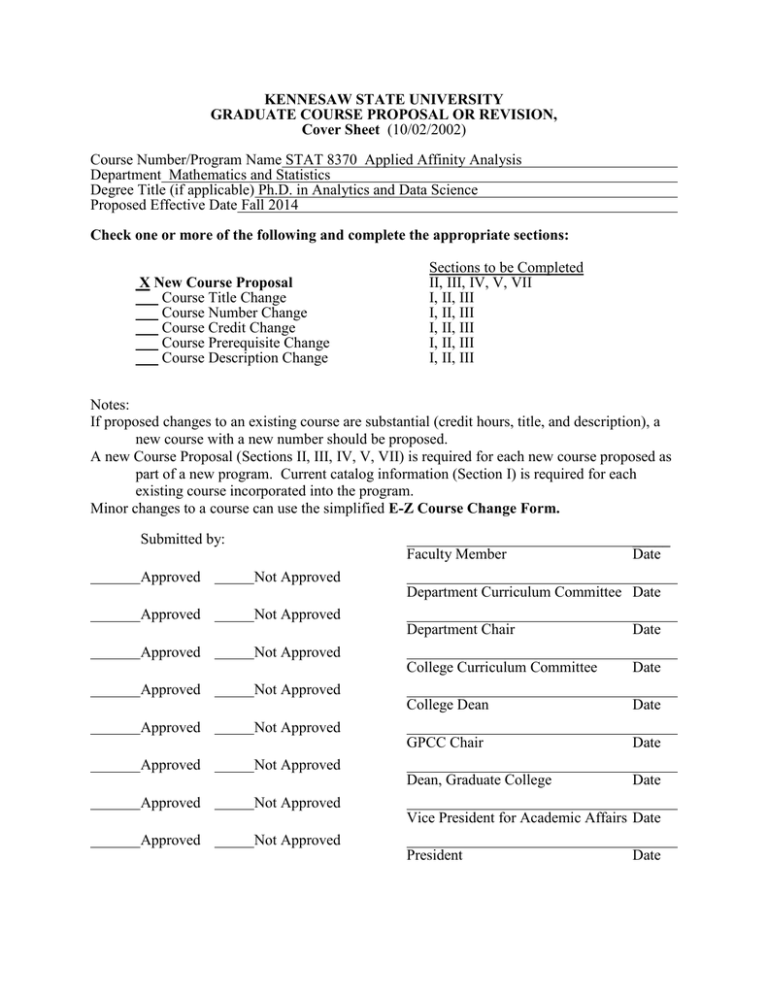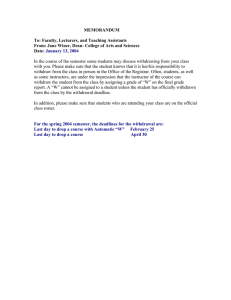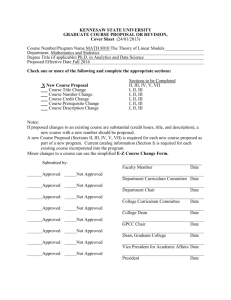KENNESAW STATE UNIVERSITY GRADUATE COURSE PROPOSAL OR REVISION, Cover Sheet
advertisement

KENNESAW STATE UNIVERSITY GRADUATE COURSE PROPOSAL OR REVISION, Cover Sheet (10/02/2002) Course Number/Program Name STAT 8370 Applied Affinity Analysis Department Mathematics and Statistics Degree Title (if applicable) Ph.D. in Analytics and Data Science Proposed Effective Date Fall 2014 Check one or more of the following and complete the appropriate sections: X New Course Proposal Course Title Change Course Number Change Course Credit Change Course Prerequisite Change Course Description Change Sections to be Completed II, III, IV, V, VII I, II, III I, II, III I, II, III I, II, III I, II, III Notes: If proposed changes to an existing course are substantial (credit hours, title, and description), a new course with a new number should be proposed. A new Course Proposal (Sections II, III, IV, V, VII) is required for each new course proposed as part of a new program. Current catalog information (Section I) is required for each existing course incorporated into the program. Minor changes to a course can use the simplified E-Z Course Change Form. Submitted by: Faculty Member Approved _____ Date Not Approved Department Curriculum Committee Date Approved Approved Approved Approved Approved Approved Not Approved Department Chair Date College Curriculum Committee Date College Dean Date GPCC Chair Date Dean, Graduate College Date Not Approved Not Approved Not Approved Not Approved Not Approved Vice President for Academic Affairs Date Approved Not Approved President Date KENNESAW STATE UNIVERSITY GRADUATE COURSE/CONCENTRATION/PROGRAM CHANGE I. Current Information (Fill in for changes) Page Number in Current Catalog ___ Course Prefix and Number ___ Course Title ___ Class Hours ____Laboratory Hours_______Credit Hours________ Prerequisites ___ Description (or Current Degree Requirements) II. Proposed Information (Fill in for changes and new courses) Course Prefix and Number _STAT 8370_________ Course Title _Applied Affinity Analysis________ Class Hours 3 ____Laboratory Hours_0____CreditHours___3 ___ Prerequisites STAT 8250 Description (or Proposed Degree Requirements): Affinity analysis seeks to identify the presence and strength of relationships whereby activities tend to occur together. The course begins with coverage of the fundamental methods and concepts revolving around association rules. The second half of the course focuses on market basket analysis, a specific application of affinity analysis that focuses on consumer purchasing. Students are required to obtain transaction-level retail data (most likely from the Internet), complete a market basket analysis, and communicate the results in a formal report. III. Justification This new course will serve as an elective in both the MSAS program and in the Ph.D. in Analytics and Data Science. Students with a particular emphasis in business applications, analytics, or database construction and management are the intended audience. IV. Additional Information (for New Courses only) Instructor: TBD Text: Discovering Knowledge in Data: An Introduction to Data Mining by Daniel Larose (Wiley) Prerequisites: ________________________ Objectives: Enable students to correctly design, perform, and summarize results of an affinity analysis in an applied setting while using the latest theoretical and computational technology available. Instructional Method: Traditional in-class instruction. Method of Evaluation Homework, Exams and Final Project. V. Resources and Funding Required (New Courses only) Resource Amount Faculty Other Personnel Equipment Supplies Travel New Books New Journals Other (Specify) NA NA NA NA NA NA NA NA TOTAL NA Funding Required Beyond Normal Departmental Growth NA VI. COURSE MASTER FORM This form will be completed by the requesting department and will be sent to the Office of the Registrar once the course has been approved by the Office of the President. The form is required for all new courses. DISCIPLINE COURSE NUMBER COURSE TITLE FOR LABEL (Note: Limit 30 spaces) CLASS-LAB-CREDIT HOURS Approval, Effective Term Grades Allowed (Regular or S/U) If course used to satisfy CPC, what areas? Learning Support Programs courses which are required as prerequisites Statistics STAT 8370 Applied Affinity Analysis 3–0–3 Fall 2014 Regular APPROVED: ________________________________________________ Vice President for Academic Affairs or Designee __ VII Attach Syllabus (Attached) Course: Instructor: Office: Office Hours: Email: STAT8370 – Applied Affinity Analysis TBD TBD TBD TBD Course Pre-requisite: STAT 8250 Course Text: Discovering Knowledge in Data: An Introduction to Data Mining by Daniel T. Larose (Wiley). Because this book, like other textbooks on the topic, is not focused primarily on affinity analysis, we will supplement the course text with numerous articles and other course materials. Meeting Schedule: TBD Course Software: This is a SAS-based course. The course will use version 9.3 of Base SAS. Students are expected to have a strong working knowledge of SAS to be successful in this course. In addition, familiarity with database systems is not required but will prove advantageous. Course Description: Affinity analysis seeks to identify the presence and strength of relationships wherein activities tend to occur together. The course begins with coverage of the fundamental methods and concepts revolving around association rules. This involves careful definitions of fundamental concepts, numerous examples, and a thorough exposition of various algorithms that may be employed in association rules. The second half of the course focuses on market basket analysis, a specific application of affinity analysis that focuses on consumer purchasing. Students are required to obtain transaction-level retail data (most likely from the Internet), complete a market basket analysis, and communicate the results in a formal report. Learning Outcomes: By the end of the course, students should be able to: 1. Rigorously define and casually explain key definitions and concepts in affinity analysis, such as association rules and confidence. 2. Efficiently implement various algorithms, such as the Apriori, Mining, and GSP algorithms, in a large dataset. 3. Explain the relative advantages of the various algorithms 4. Identify issues related to missing data. 5. Conduct a full market basket analysis, from collecting data online to preparation of a professional final report. Grading will consist of four components: Grading: Homeworks (4 assignments 5% each) Midterm Exam Final Exam Final Course Project 20% 30% 20% 30% Attendance & Assignment Policies: While attendance will not be taken, you are expected to attend every class period. You are responsible for any material that you miss due to an absence. Withdrawal Policy…The last day to withdraw from the course and possibly receive a "W" is MMDDYYYY. Students who find that they cannot continue in college for the entire semester after being enrolled, because of illness or any other reason, need to complete an online form. To completely or partially withdraw from classes at KSU, a student must withdraw online at www.kennesaw.edu, under Owl Express, Student Services. The date the withdrawal is submitted online will be considered the official KSU withdrawal date which will be used in the calculation of any tuition refund or refund to Federal student aid and/or HOPE scholarship programs. It is advisable to print the final page of the withdrawal for your records. Withdrawals submitted online prior to midnight on the last day to withdraw without academic penalty will receive a “W” grade. Withdrawals after midnight will receive a “WF”. Failure to complete the online withdrawal process will produce no withdrawal from classes. Call the Registrar’s Office at 770-423-6200 during business hours if assistance is needed. Students may, by means of the same online withdrawal and with the approval of the university Dean, withdraw from individual courses while retaining other courses on their schedules. This option may be exercised up until MMDDYYYY. This is the date to withdraw without academic penalty for SEMESTER YYYY classes. Failure to withdraw by the date above will mean that the student has elected to receive the final grade(s) earned in the course(s). The only exception to those withdrawal regulations will be for those instances that involve unusual and fully documented circumstances. Academic Integrity: Every KSU student is responsible for upholding the provisions of the Student Code of Conduct, as published in the Undergraduate and Graduate Catalogs. Section II of the Student Code of Conduct addresses the University’s policy on academic honesty, including provisions regarding plagiarism and cheating, unauthorized access to University materials, misrepresentation/falsification of University records or academic work, malicious removal, retention, or destruction of library materials, malicious/intentional misuse of computer facilities and/or services, and misuse of student identification cards. Incidents of alleged academic misconduct will be handled through the established procedures of the University Judiciary Program, which includes either an “informal” resolution by a faculty member, resulting in a grade adjustment, or a formal hearing procedure, which may subject a student to the Code of Conduct’s minimal one semester suspension requirement. Unauthorized Collaboration: Submission for academic credit of a work product, or a part thereof, represented as its being one's own effort, which has been developed in substantial collaboration with or without assistance from another person or source, is a violation of academic honesty. It is also a violation of academic honesty knowingly to provide such assistance. Collaborative work specifically authorized by a faculty member is allowed.


